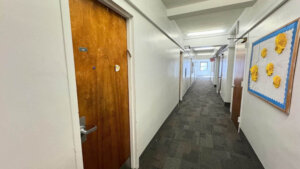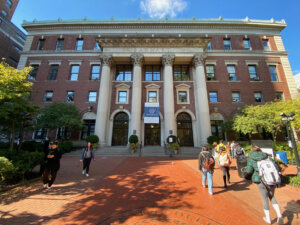Your turn: Readers respond to Barnard’s dorm-door decoration ban
‘The college dorm room is the place where the individual and the collective meet.’

Pro-Israel and Pro-Palestinian protesters demonstrate around the Barnard-Columbia campus, Feb. 2024. Photo by Alexi J. Rosenfeld/Getty Images
We’ve been flooded with thoughtful, fulsome responses from readers to Jodi Rudoren’s recent column about Barnard College’s new policy banning students from putting anything on the doors of their dorm rooms.
The policy, which took effect last week, came after Barnard and the university it’s part of, Columbia, were sued for failing to protect Jewish students from antisemitism. Many Barnard students had put pro-Palestinian posters including “Resist Colonial Power By Any Means Necessary” and “Zionism is Terrorism” on their doors.
In the column, Rudoren, who is editor-in-chief of the Forward, said Barnard was abdicating its responsibility to foster a safe environment for free expression, and that the policy threatened the future of democracy. When, she asked, did the effects of what someone says become more important than their right to say it?
“Can kids today really not handle walking by signs they disagree with — or even find deeply disturbing or offensive?” Rudoren asked. “Does that mean they also cannot live with — or even near — people who hold those views? Or they just…don’t want to know who their neighbors really are and what they think and feel and why?”
Well, we always want to know what our neighbors — and especially you, our readers — “think and feel and why.” Below, a selection of your feedback, lightly edited for clarity and length.
Protecting students — and speech
If I were in a dorm, I would look for a door with both Israeli and Palestinian flags — that is what is needed!
Free-speech advocates annoyed at perceived repression of their speech should be asked about comparable speech on the other side. For example, would those OK with “Zionism is racism” allow “Palestinian advocates are Islamofascists” and vice-versa?
— Barry Schiller
Differing from Dartmouth College, which is hosting debates, Barnard and even more so Columbia are not monitoring speech; they are putting their heads in the sand about the nature of the speech being expressed. If there were dialogue sessions discussing the issues inherent in the Israel/Hamas war with civility and curiosity, the situation would be different.
When any student fears for her life or is harassed, demonized or bullied due to her race, religion, or gender, the administration has an obligation to protect her and help her receive an education in an environment that supports her. When any student feels that her legitimate views are not respected, she has a right to protest.
Whoever is in charge these days must feel desperate to protect their students, while at the same time desperate to protect free speech in a climate where the body politic nationally encourages and supports hate speech, misinformation, bullying, harassment and a lack of civil discourse.
Colonialism, apartheid, and genocide need to be explained as trigger terms that have to be examined in context, not just used as catch phrases or bumper stickers.
— Rabbi Cheryl Weiner, Barnard College Class of 1971
If someone posted KKK materials calling for white people to hang Black people, or for anti-abortion advocates to kill pro-choice people, I believe you’d support some regulations against such postings. Anti-Israel and anti-Jewish postings are approaching that level of cruelty and I cannot understand why you place such a priority on free speech that you are against Barnard’s new regulations.
I am for free speech, too, but within limits — and we’ve reached those limits.
At this point in time we need to support universities that are at least trying to make Jewish students’ lives tolerable.
— David P. Varady

‘Where the individual and the collective meet’
I was the senior writer at Barnard for nearly 18 years before heading out on my own as a freelancer in late 2019. I know the college quite well, and am distraught over the trend lines that I am seeing.
As you so perfectly said, when did college become a place where comfort was the key to success? I went to college many decades ago, but I do recall that it was where I figured out what I believed, not because I was looking at blank doors and kiosks and walls, but quite the opposite.
I am struggling at this tough time over the war in Gaza. I hate the fighting and the current Israeli leadership, but I am Jewish and I want Israel to exist. It’s not an easy equation to solve by any means. I feel the burden daily, and I appreciate the Forward for helping me sort out some of this mess.
Too bad our academic institutions — I am a Harvard alum, talk about messes! — can’t seem to stay in their lanes and do what they supposedly do best. Educate.
— Beth Saidel
As someone who worked in university design and construction for over 25 years, and the parent of a college-bound child, I was appalled at Barnard’s police. We have somewhere along the way lost our ability to create a culture of constructive dialogue on college campuses, recognize and take actions against threatening (vs. uncomfortable) behaviors, and give our students the important opportunity for self-expression.
My research as an undergraduate was in student housing at women’s colleges and my argument was that the front “porch” of the college dorm room is the place where the individual and the collective meet.
Thank you for being that porch for those that read the Forward. I love the way that you present a wide range of Jewish perspectives. One people, many varieties.
— Lori Mazor
‘Barnard got it right’
People living in a dorm should not have to walk past doors with messages that they find deeply disturbing. Would you take the same stance if it were a white supremacist posting racist messages on his door? I sure hope not.
Your dorm is your home; your ultimate safe space. If I were living in a dorm where there were multiple antisemitic messages on people’s doors, I would not want to talk with people who would post such messages. I’ve tried. Nothing changes their minds. Or mine.
How can you find common ground with people who believe that Oct. 7 was an inside job by the IDF so they’d have an excuse to invade Gaza? Or people who insist that stories of sexual violence and baby murder on Oct. 7 have been “debunked”? You can’t.
Nowadays, I simply avoid such people. But if I were living in a dorm where such messages were prevalent on most doors, I would feel unsafe. With good reason.
Students should not be forced to walk by those messages in their very homes. Regardless of what those messages say. If you’re not OK with someone posting blatantly racist messages on their door — and I hope you’re not — you should not be OK with antisemitic or Islamophobic messages being displayed.
Barnard got it right. People have a right to peace in their homes without a daily reminder that their neighbors despise them.
— Susan Hochtman
I could not disagree with you more: placing antisemitic or harassing messages on doors only further increases hatred.
And it is truly naive to believe that conversations are at all possible.
Based on the behavior of the face-covered protesters, I think the reaction to any attempted “conversation” would end up with violence from the face-covered protesters.
— Deb Weinstein
I applaud the efforts of the University to make housing more comfortable for everyone.
There are students with family problems, students from low income backgrounds struggling with poverty, students affected by political issues, students with disabilities, students who don’t need other people’s wealth or social lives thrown in their faces. The dry-erase boards on dorm-room doors can be used by manipulators and bullies to isolate their targets.
Blind students can’t see the dry-erase boards, so they are, by definition, excluded. A blind student was in the room next to mine in my sophomore year at the University of Pennsylvania.
— Linda Seltzer

The dorm is a sanctuary, a place of refuge
I agree that there should be freedom of speech on campus and that pointed hate speech or actions towards individuals should be criminally investigated. But it seems that putting hateful slogans on dormitory doors is inconsistent with the idea of the dorm as a sanctuary.
Suppose every door in a hallway has a pro-Hamas or anti-Jewish/Israeli slogan on it. I’m Jewish and pro-ceasefire, but if I had to walk down that hallway to get to my room, it wouldn’t feel like a sanctuary to me.
It’s a tough time for administrators and students on college campuses — no easy answers to balancing free speech with protecting students from what feels like hateful attacks. Maybe administrators could allow students to put up signs in specified areas; we used to have a common room when I went to the University of Chicago (1968-72). That room might not be a sanctuary if this policy were put in place, but at least students who are uncomfortable with the expressions of free speech could avoid it.
— Rochelle Diogenes
I share your distrust of anything that abridges free expression. However, when you rail against the un-festooning of dorm doors, you pretend there are not in place labyrinthine anti-microaggression policies on most campuses and Kafkaesque systems for anonymously reporting gestures or statements that make certain students “feel unsafe.” There are.
I, for one, believe that Israel Apartheid Week “eviction notices” should not be permitted to be distributed in dorms. I think dorms should afford privacy and a respite from campus tumult.
A dorm is where students live. Each little room is a home inside the communal home that is the campus. My daughter attended Yale, Class of 2012, and I don’t recall dorm or residential college doors covered with political or other messaging. Still, the self expression of Yale was remarkable and very, very free.
Apolitical communal zones allow students to connect in ways other than the tribal groupings politics creates. Civility is not silencing.
The whole free expression thing is so starkly clear until it’s not. When does speech become harassment or bullying or threatening? And if speech is free, what is happening to freedom when one person or group silences the speech and expression of others?
— Jo Perry
When I was at Davidson College (1964-66), there were 1,000 Protestant white men, five Jews and 12 Black students. I put a sign on my dorm door that said, “North Carolina Aleph Branch, International Jewish Conspiracy.”
— Gus Kaufman
Going back to your dorm is like going home. It’s a place of rest and refuge. We all need that in these times when we’re bombarded by contentious information. A respite from accusations and guilt about things we have no control over.
We now limit the news that comes into our house for the same reason. I don’t want to be in a constant state of anxiety and agitation again about things I have no control over. It’s your job to be constantly informed, but it’s not everyone’s. Some folks would like to cultivate some peace in their lives.
— Rosemary Zibart
‘I fear for the future of American Jewry’
I find it interesting that your concluding sentence was “F— your censorship”.
The very fact that you didn’t spell the F word reflects your compliance with rules and attitudes regarding censorship. Using the F word doesn’t offend me. I reckon it doesn’t offend you either. Many Jewish students are threatened for real by the words and deeds of pro-Hamas students.
I grew up in Skokie, Illinois. Thousands of us came to protest the Neo-Nazi March in the late 1970s. My parents were Holocaust survivors. My Dad read the Yiddish Forward. My Mom was instrumental, along with Erna Gans, in establishing the Illinois Holocaust Museum.
Words have meaning. With self expression, does everything and anything go? What about a swastika on a door in your daughter’s dorm room?
Barnard, which is my wife’s alma mater, could have handled this differently. Allow creative expression but promulgate standards to promote safety and student unity. This can be done by teaching that my freedom of expression ends at your nose.
— Michael Korn
I am a great-grandmother so I realize my comments may seem outdated, but I think posting hateful messages like “Hitler Was Right” and “ Zionist Pigs” are not in the same universe, let alone the same league, as “Come to a party” or “Let’s play Monopoly. “
There is an atmosphere of hatred that goes beyond cute decorations.
I am the widow of a Holocaust survivor. The ACLU marching to allow the Nazis to march in Skokie was so very upsetting for both myself and my husband. I canceled my membership and have not renewed it.
I do not believe in allowing people who preach hatred a public platform.
I was born in 1937. I grew up in Detroit. If you think allowing Father Couglin’s radio broadcasts calling Jews vermin was protected free speech — or, moving forward, that Louis Farrakhan’s call for murdering Jews and gay people should be protected speech — then I fear for the future of American Jewry.
When people are told over and over again that it is OK to hate Jews there is no turning back from another Holocaust.
No, there are not very fine people on both sides. And as Jews we must begin to be more self-protective. These last few months have been eye opening for this old liberal Democrat.
I think it is time our schools go back to educating, not indoctrinating.
— Rhona Bader

Defining antisemitism
Why don’t Jews have the right to define what is antisemitism?
If no college would tolerate the posting of racist comments directed at Black and Hispanic students, why is it OK for students to chant or post slogans that “Zionism is Racism or “From the river to sea” when it is clear their intent is to convey the message that Israel has no right to exist as a Jewish state — which the vast majority of Jews and the public at large believe is an expression of antisemitism?
Antisemitism must be treated the same as other forms of hate. If a university will not tolerate hate speech directed at one minority, it must not tolerate hate speech directed at a different minority.
This does not mean that all signage on dorm-room doors should be banned, but it does mean, all hate speech should be banned.
— Phil Stern
Prior to the Barnard dean’s decision about flyers on dorm room doors, Jewish and pro-Israel students were confronted by signs that called for the annihilation of Israel, i.e. the murder of half of world Jewry. I imagine those students would then have difficulty studying and even sleeping.
The milieu of Columbia-Barnard currently is blatantly antisemitic. The dean has simply taken an important step to reverse a toxic climate.
— Robert Feinstein
‘I live in fear and sadness’
I am curious how many Forward readers would tolerate messages such as “abortion is murder” or “there are only two genders” and how many Forward readers have shown up to shout down or shut down politically conservative guest speakers on college campuses.
On the other hand, the Israeli/Hamas issue is kind of complex. It seems that some “messages” cross the line from being protected speech to being threats of physical violence or intimidation. The real line is crossed when (as with many left-wing protests — and ANY “antifa” “protest”) the words aren’t deemed to be enough of a protest. Right?
— Ned Williams
There should be a line between something offensive and something funny or strange but harmless or just fun.
People think that they are protecting poor Palestinians from vicious colonial settler Israelis. They do not understand that they are supporting the eradication of Israel and its replacement with an Islamic state and the eradication of Jews everywhere. If they do support that, shame on them.
If someone put a cute lynching picture on the door — you know, the “strange fruit” — or said, “Let’s lynch all Black people” or immigrants, everyone would be appalled.
Somehow, blaming Israel for something they didn’t start, didn’t want and have tried to be as careful as possible with is not deemed “offensive.” Except it is.
— Janyce C. Katz















